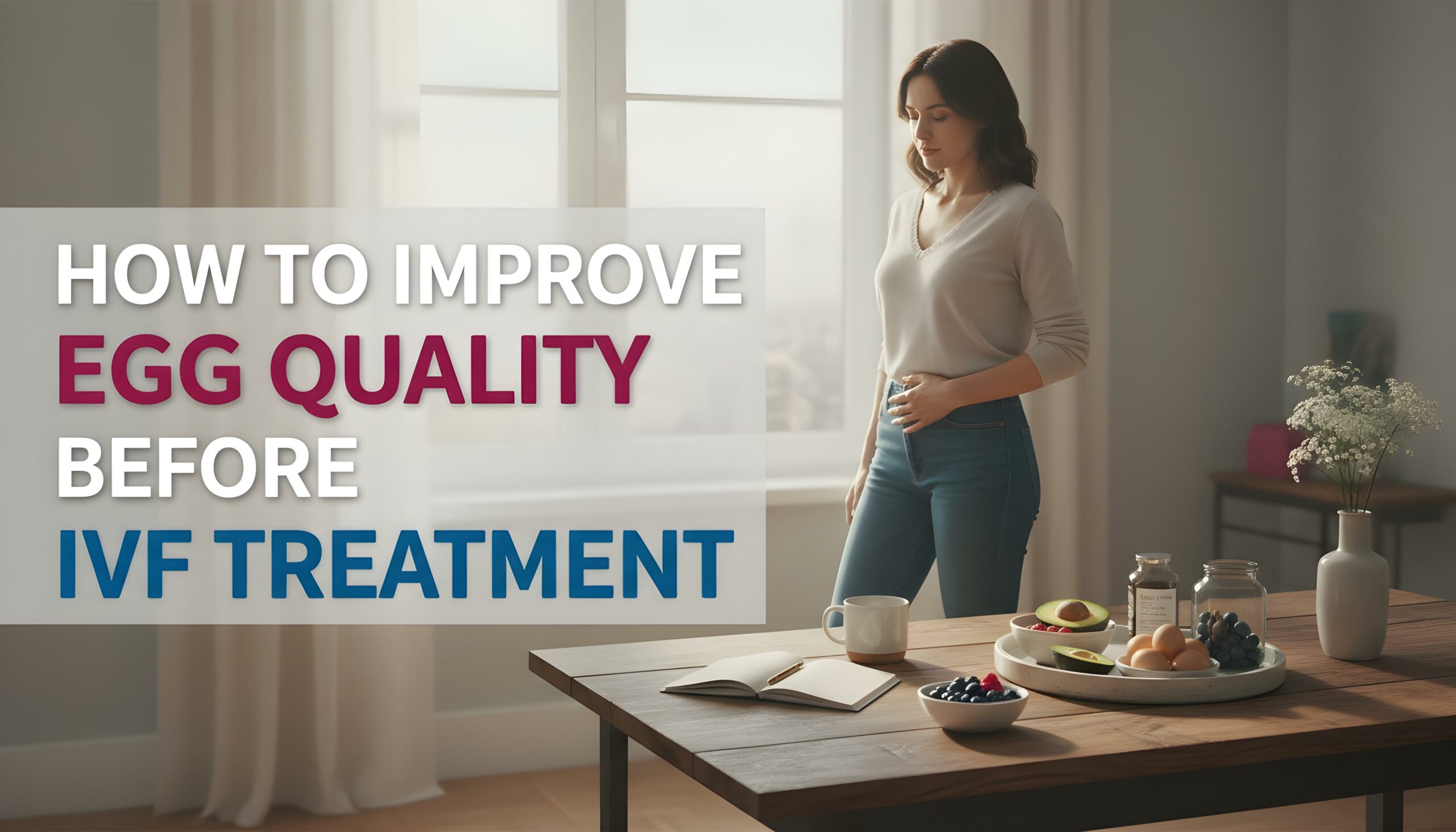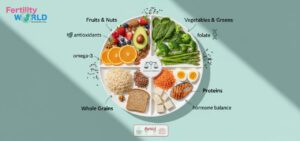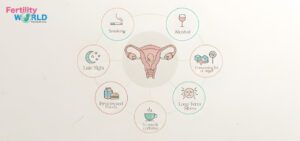This blog post explains why egg quality is just as important as egg count in IVF and how it directly affects how embryos grow, how they implant, and how well the pregnancy progresses. It explains what “egg quality” really means, why it naturally declines with age, and how aspects of your lifestyle, hormones, and surroundings can help or harm your eggs. You’ll also learn easy, practical ways to improve the health of your eggs through diet, supplements, lifestyle changes, and medical procedures such as personalised IVF protocols and PRP. The blog is mostly positive and realistic about how to grow healthier eggs so that your IVF cycle has the best chance of success.
Connect with Fertility World Specialists Today — Get a Free Egg Quality & IVF Planning Consultation
+91 9311850412 |Email- info@fertilityworld.in
Why Egg Quality Matters in IVF Treatment
Since each kid starts out as a single cell, IVF requires at least one healthy egg.The quality of your eggs is important for IVF since it affects how well embryos develop, attach, and mature into healthy infants. Infertility treatments and early losses often fail because the eggs aren’t good enough. Age, culture, or chemical imbalances can all lead to this. The good news is that you can easily boost the quality of your eggs before IVF by eating right, taking supplements, and getting specific medical care. Focusing on the quality of your eggs will give your body the best chance to make strong embryos and have a successful IVF result.
No matter what age you are, if you eat well and do other good things, your ovaries can still make better eggs. Don’t forget that you don’t need to be perfect to get better eggs or IVF results.
Understanding Egg Quality — What It Means
Egg quality means how healthy and naturally normal an egg is. An egg of good quality has the correct number of chromosomes and enough energy to grow into a strong baby once it is fertilised. To the contrary, bad eggs might have chromosomal problems that make it harder for the baby to grow or implant properly.
Your body gets eggs ready every month that have been maturing since before you were born. This is a normal process that shows how closely female fertility and egg health are linked. The number of healthy eggs a woman has slowly declines as she ages.
This can affect the success of both natural conception and IVF. The first thing you can do to improve your eggs and get your IVF trip off to the best possible start is to learn how eggs are made and what makes them good or bad.
Biological Definition of Egg Quality
Egg quality means how healthy and strong an egg is. A good-quality egg has normal chromosomes and enough energy to grow into a healthy embryo after fertilisation. These eggs can mature properly, get fertilised easily, and support early embryo growth — all of which are important for a successful pregnancy.
Why Egg Quality Declines with Age
When a girl is born, she has all of her eggs. Their last egg will never be made again. It can be harder to get pregnant because the eggs don’t fix DNA as well as they should. This can cause problems with the genes. This happens to everyone as they age, but good habits and care during the first few months of your pregnancy can help keep you safe.
Remember that you can’t change your age, but you can improve the health of your eggs by eating well, dealing with stress, and getting fertility care on time. Every little thing you do helps your body get ready for a safe pregnancy.
Factors That Affect Egg Quality Before IVF
| Factor | Effect on Egg Health |
|---|---|
| Age | Reduces chromosome stability |
| Stress | Increases cortisol and disrupts reproductive hormones |
| Smoking & Alcohol | Damage DNA and lower ovarian reserve |
| Obesity | Alters hormone levels and causes insulin resistance |
| Poor Diet | Reduces antioxidant protection and egg nourishment |
| Environmental Toxins | Affect mitochondria and weaken egg structure |
Many factors can affect the health of your eggs before embryo transfer. For example, older eggs are more likely to have problems with their chromosomes, which is one of the main reasons why eggs don’t grow well. Stress boosts the hormone cortisol, which can mess up ovulation and reproductive hormones. Illnesses like smoking and drinking alcohol cause oxidative damage. Being overweight and poor diet can also cause hormonal imbalances and low antioxidant levels, which can harm egg cells. Toxicity from plastics, pollution, or herbicides can even affect mitochondria and lower the egg’s energy. These living choices that can affect fertility can be managed to greatly increase your chances of success during IVF.
Medical Tests That Evaluate Egg Quality
Doctors do some ovarian reserve tests to find out how many eggs you have and how good they are before they start IVF. The FSH and estradiol tests, the antral follicle count (AFC), and the AMH test before IVF can all help doctors figure out how your body will react to reproductive treatment.
AMH (Anti-Müllerian Hormone) Test
| AMH Level (ng/mL) | Fertility Status |
|---|---|
| >3.0 | Excellent reserve |
| 1.5–3.0 | Moderate |
| 0.8–1.4 | Low |
| <0.8 | Very low |
AMH is a test that measures the hormone that your ovaries’ small cells release. In addition to showing how many eggs are left, it also gives you an idea of how healthy the eggs are overall. Most people’s AMH levels drop after age 35, which means their ovaries aren’t as healthy and IVF drugs aren’t working as well.
FSH and Estradiol
The FSH (Follicle-Stimulating Hormone) and estradiol tests are done on day 2 or 3 of your menstrual cycle.
- High FSH (>10 IU/L) often means the ovaries are working harder to produce eggs — a sign of reduced reserve.
- When combined with estradiol levels, it helps doctors evaluate how your eggs may respond to ovarian stimulation during IVF.
Antral Follicle Count (AFC)
A vaginal ultrasound is used to perform the AFC test. There are small sacs filled with fluid in both ovaries. These are called antral follicles, and they can grow into developed eggs. A smaller AFC usually means fewer eggs can be retrieved, while a higher count indicates a higher potential for pregnancy.
Natural Ways to Improve Egg Quality Before IVF
It takes time, patience, and care to make eggs better naturally. How your ovaries work and how well your eggs grow are all affected by what you eat, how stressed you are, and the things you do every day. Changes to a few simple parts of your life can help you get pregnant and get your IVF trip off to a better start.
Here are some natural ways to improve the health of your eggs and tips that have been shown to work:
Eat a diet full of antioxidants
Eat things that are high in selenium, zinc, vitamin C, and vitamin E. Examples include berries, citrus fruits, greens, nuts, avocado, and fish. Losing electrons is one of the main factors that causes eggs to age. Antioxidants lower it.
Stay at a healthy weight
Hormones often don’t work right for women who are either too thin or too fat. For better egg quality and ovulation balance, try to get your BMI between 20 and 24 before you start IVF.
Make women’s ovaries get more blood
Do light yoga, brisk walks, or a gentle fertility massage. By doing these things, you improve the ovaries’ oxygen flow and nutrient supply, which produces healthier eggs.
Lower Your Stress Levels
The stress hormone cortisol rises over time, which damages ovulation hormones like FSH and LH. For daily stress relief, try deep breathing, mindfulness, meditation, or writing in a notebook.
Resting and drinking water
Regular sleep of 7 to 8 hours a night is recommended to keep hormones in balance and egg cells growing. Drinking daily 2 to 3 litres of water is important for keeping your body and reproductive system healthy and refreshe
Best Supplements to Improve Egg Quality Before IVF
In addition to a healthy lifestyle and well-balanced diet, some egg quality vitamins can help the ovaries work better and the embryo grow. The nutrients work by making cells more energetic, hormones more balanced, and eggs healthier in general. Before taking any new vitamin or supplement, you should always talk to a fertility expert.
Coenzyme Q10 (CoQ10)
- Improves energy and DNA repair by making mitochondria work better in eggs.
- It helps older women or women whose ovaries don’t respond well to hormones.
- 200 to 600 mg per day (talk to your doctor).
DHEA (Dehydroepiandrosterone)
- Helps the ovaries respond better and raises the number of antral follicles in women who don’t have enough AMH.
- Could make more and better eggs before IVF.
- It should only be taken under a doctor’s supervision.
Vitamin D and Omega-3 Fatty Acids
- Vitamin D helps keep hormones in balance, supports follicle growth, and helps implants stick
- The ovaries get more blood and are less inflamed when omega-3 fatty acids are present.
- Together, they help improve the health of your fertility in general.
Myo-Inositol and Folic Acid
- Help the egg mature and make ovulation better, especially for women who have PCOS
- Folic acid helps make DNA and lowers the chance that eggs will have chromosomal mistakes.
| Supplement | Main Benefit | Recommended Use |
|---|---|---|
| Coenzyme Q10 (CoQ10) | Boosts mitochondrial energy and DNA repair in eggs | 200–600 mg/day (consult your doctor) |
| DHEA (Dehydroepiandrosterone) | Improves ovarian response and increases antral follicle count | Only under medical supervision |
| Vitamin D & Omega-3 Fatty Acids | Support hormone balance, follicle growth, and reduce inflammation | Regular intake through food or supplements |
| Myo-Inositol & Folic Acid | Help egg maturation, insulin balance, and reduce chromosomal errors | Especially beneficial for women with PCOS |
Fertility Diet Plan Before IVF
What you eat is a big part of getting your body ready for IVF. For women trying to get pregnant, a well-balanced diet gives your eggs the nutrients they need to develop properly and improves the health of your hormones in general. If you eat the right foods to improve the health of your eggs, you may have a better chance of fertilisation and implantation.
| Meal Type | Foods to Include | Why It Helps |
|---|---|---|
| Morning | Warm water with lemon, handful of nuts, and fresh fruit | Helps detoxify the body and provides antioxidants to protect egg cells |
| Lunch | Whole grains, green vegetables, and legumes | Rich in folate, zinc, and fiber, essential for egg development |
| Dinner | Light meal with soup, lentils, or lean protein | Improves metabolism and supports hormone balance |
| Snacks | Flax seeds, chia seeds, or sunflower seeds | Provide omega-3s and support healthy estrogen levels |
Stay away from caffeine, booze, processed foods, and refined sugar. These things can mess up hormones and make egg cells more vulnerable to oxidative stress.
Medical and Clinical Ways to Improve Egg Quality
Lifestyle changes and vitamins aren’t always enough to help. In these situations, fertility experts use cutting-edge medical methods to improve the quality of the eggs to help the ovaries work better and improve the chances of success with IVF. To make sure you get the best results, these methods are tailored to your hormone levels, ovarian reserve, and age.
Personalized IVF Protocols
The amounts of AMH, FSH, and AFC help doctors make unique IVF plans for each patient. To help your ovaries make better, more mature eggs without putting too much stress on your body, they change the amount of medicine you take. In order to fertilize and grow the baby, the goal is to get the best eggs.
PRP Ovarian Rejuvenation Therapy
Your own blood is used to make platelet-rich plasma (PRP), which is then injected into your ovaries as part of this treatment. PRP has growth factors that can wake up follicles that are at rest, make the ovaries work better, and may help raise AMH levels and egg count.
How Long Does It Take to Improve Egg Quality Before IVF
It takes time to make eggs better; it doesn’t happen overnight. About three months pass before eggs are fully grown inside the ovaries. So, doctors say you should start your fertility preparation plan at least three months before IVF. This plan should include a healthy diet, vitamins, and lifestyle changes. So, your body has time to produce stronger, more nutritious eggs for treatment.
| Time Frame | What Happens | Focus Area |
|---|---|---|
| 0–1 Month | Hormonal balance begins to improve | Start healthy diet and fertility supplements |
| 1–2 Months | Mitochondria in egg cells get stronger | Add regular exercise and reduce stress |
| 2–3 Months | Healthier eggs begin to mature | Prepare for IVF cycle and continue good habits |
| 3+ Months | Peak fertility and improved egg quality | Maintain diet, rest, and positive routine |
Tip:- Stay regular – your body need support for those 90 days to create the best eggs possible for IVF success.
Habits That Harm Egg Quality Before IVF
It’s important to know what to avoid before IVF if you want the best chance of success. Some things you do every day can slowly hurt the health of your eggs and make it harder for your body to heal properly. These bad habits can hurt your fertility, but giving up them can protect your eggs and raise your chances of a healthy baby.
- Smoking: It damages egg DNA and reduces ovarian reserve.
- Alcohol messes up hormones and makes eggs less healthy.
- Late nights: Melatonin, a hormone that helps eggs develop properly, is changed.
- Consuming a lot of sugar leads to insulin spikes and biochemical imbalances.
- Processed foods contain chemicals and trans fats that worsen oxidative stress.
- Long-term stress—increases cortisol and stops pregnancy
- Too much caffeine can throw off your hormone balance and make you lose water.
Age, AMH, and Egg Quality — Understanding the Connection
Age plays an important role in both the quantity and quality of eggs a woman has. The AMH (Anti-Müllerian Hormone) level helps doctors guess ovarian reserve and fertility potential. As age increases , AMH levels naturally lows down and the chances of having healthy genetically normal eggs also go down. However, with early planning lifestyle changes and medical support many women still achieve successful IVF outcomes.
| Age | Average AMH (ng/mL) | Egg Quality Status |
|---|---|---|
| 25 | 4.0–5.0 | Excellent |
| 30 | 2.5–3.5 | Good |
| 35 | 1.5–2.5 | Declining |
| 40 | <1.0 | Poor |
After age 35, both egg number and DNA quality start to decline more sharply. But the right food supplements and fertility care can still improve ovarian response and increase IVF success rates even in later reproductive years.
Realistic Expectations — Can Poor Egg Quality Be Reversed?
Many women want to know whether they can improve the quality of their eggs. The honest answer is no, you can’t make more eggs, but you can make them better. It is possible to make eggs that are healthier, work better during IVF, and increase the chances of getting pregnant, even if your AMH levels are low.
By focusing on four main areas, you can make things better:
- Energy in cells (mitochondria): Helps eggs grow and embryos form.
- The right balance of hormones helps the egg mature and ovulate properly.
- Oxidative stress can hurt eggs, but antioxidants protect them.
- Blood circulation: Makes sure that nutrients and oxygen get to the eggs properly.
Even though these steps won't turn back the clock on your age, they can help your body use your eggs in the best way possible so that IVF works.
Final Thoughts — Nurture Your Eggs, Nurture Your Dream
IVF works best when the eggs are of good quality. Be aware that age is not everything; with the right care, you can still have healthy eggs. Your body will make better eggs if you eat well, take your vitamins, and see your doctor on time.
Start early, stay healthy, and believe in yourself. Every small effort you make brings you closer to becoming a parent.
Your journey to motherhood begins with one healthy egg — take care of it with love, patience, and good guidance.
Book a Fertility Consultation at Fertility World to learn how to keep your eggs healthy and improve your chances of a happy IVF result.
How long does it take to improve egg quality?
Eggs take about 90 days (3 months) to mature, so start your fertility plan at least 3 months before IVF.
Can poor egg quality be fixed?
You can’t make new eggs, but you can improve the quality of existing ones with a healthy lifestyle and medical care.
Which foods help improve egg quality?
Eat berries, leafy greens, nuts, avocado, whole grains, and fish — they’re full of antioxidants and healthy fats.
Do supplements really help egg quality?
Yes. CoQ10, Vitamin D, Omega-3, and Myo-Inositol can help eggs grow healthier and improve IVF success.





